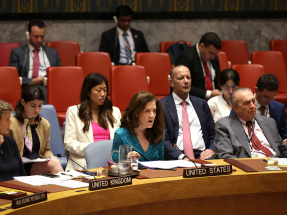Iran launched a missile attack on an American air base in Qatar on Monday that caused no injuries, and US President Donald Trump dismissed it as a "weak response" to US attacks while urging Iran and Israel to make peace as the conflict entered its 12th day.
The attack on Al Udeid Air Base in neighbouring Qatar threatened to widen a conflict that began on June 13 with an Israeli strike on Iran targeting its nuclear programme and ballistic missiles.
Iran had threatened to retaliate against the United States after US bombers dropped 30,000-pound bunker-busters on Iranian underground nuclear facilities at the weekend, joining Israel's war against Iran, and Trump had raised the possibility of the Iranian government being toppled.
"We did not assault anyone, and we will never accept being assaulted by anyone," Iran's Supreme Leader Ayatollah Ali Khamenei said in a statement. "We will not submit to anyone’s aggression – this is the logic of the Iranian nation."
Iran gave advance notice to the US via diplomatic channels hours ahead of the attack, as well as to Qatari authorities. Trump seized on that as a positive sign.
"I want to thank Iran for giving us early notice, which made it possible for no lives to be lost, and nobody to be injured," Trump wrote on his Truth Social media site. "Perhaps Iran can now proceed to Peace and Harmony in the Region, and I will enthusiastically encourage Israel to do the same."
He said Iran fired 14 missiles at the air base, calling it "a very weak response, which we expected, and have very effectively countered."
"I am pleased to report that NO Americans were harmed and hardly any damage was done," Trump wrote. "Most importantly, they’ve gotten it all out of their 'system,' and there will, hopefully, be no further HATE," Trump wrote.
Iran's handling of the attack recalled earlier clashes with the United States and Israel, with Tehran seeking a balance between saving face with a military response but without provoking a cycle of escalation it can't afford.
The country's Foreign Minister Abbas Araqchi said Iran was ready to respond again in case of further action by the United States, according to a statement posted by the ministry's account on Telegram.
The attack strained Iran's relationship with its Arab neighbors: Qatar condemned it, as did Bahrain, the United Arab Emirates, Saudi Arabia, Kuwait and Iraq.
"There are deep ties between the two states (Iran and Qatar) and the two nations, but the attack undoubtedly calls for a genuine meeting and a clear stance," Qatari foreign ministry spokesperson Majed Al Ansari said at a press conference.
Meanwhile, Israel said it carried out its most extensive wave of attacks on Tehran ever on Monday.
Targets included a Tehran prison where Iran's leadership holds political opponents, in a renewed demonstration of its willingness to strike beyond its previously stated military and nuclear targets and attack key pillars of Iran's ruling system.
Despite Iran's threats to challenge oil shipments from the Gulf, oil prices fell 7 percent in volatile trading, suggesting traders doubted the Islamic Republic would follow through on any action that would disrupt global supplies.
Qatar, situated just across the Gulf from Iran, reopened its airspace after a brief suspension, its civil aviation authority said early on Tuesday. Iran's foreign minister met Russian President Vladimir Putin in Moscow as Tehran sought backing from one of its last major power friends for its next steps. (Reuters)
_____________________________
Last updated: 2025-06-24 HKT 06:03





















